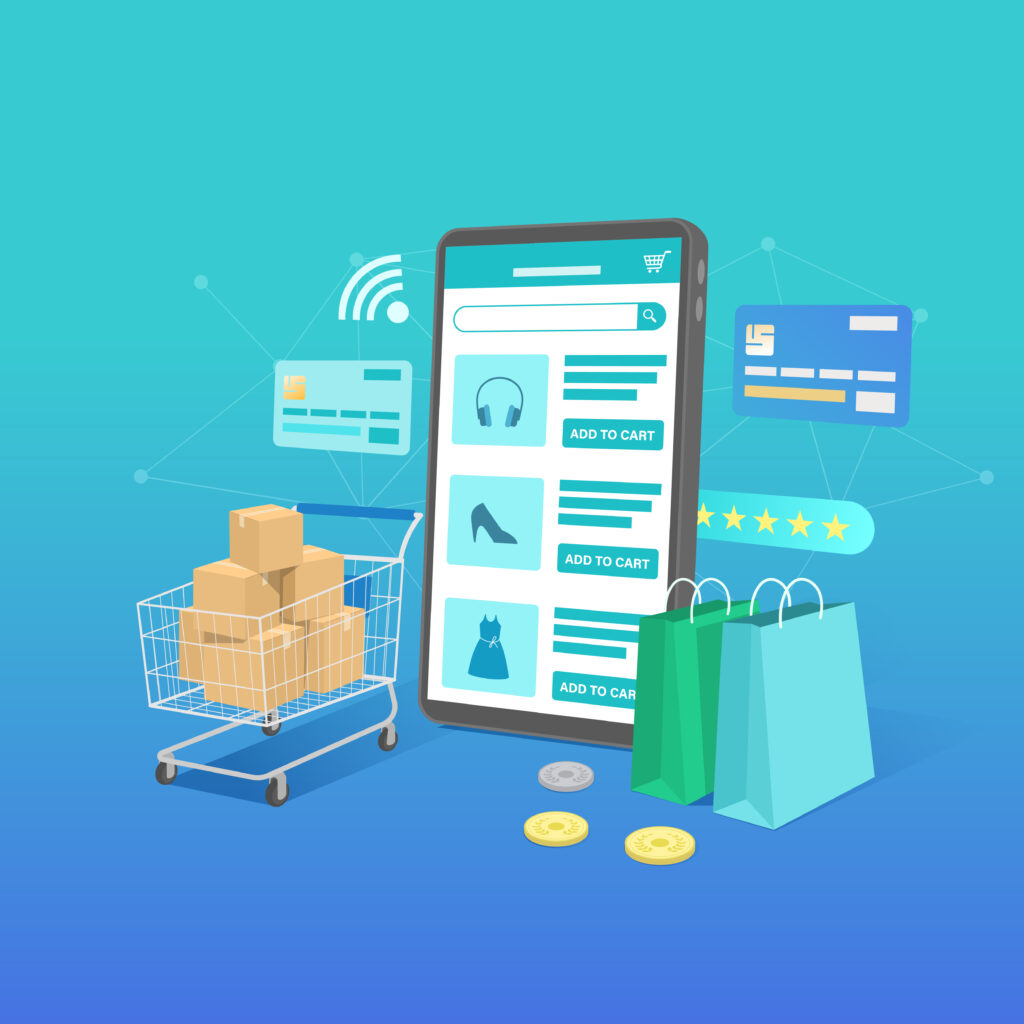As the e-commerce landscape evolves, marketplace app development is fast becoming the driving force behind its future. Traditional online stores are increasingly giving way to dynamic, user-friendly marketplace platforms that connect buyers and sellers more efficiently. The global shift toward mobile commerce, coupled with advancements in technology, has made marketplace apps essential for businesses to stay competitive.
In this blog, we will explore why marketplace app development is shaping the future of e-commerce, the benefits it offers to businesses and consumers, and what to expect in the years to come.
The Rise of Marketplace Apps in E-Commerce
Marketplace platforms such as Amazon, eBay, Alibaba, and Etsy have fundamentally changed how people shop online. Rather than visiting individual stores, customers now prefer the convenience of a marketplace, where multiple sellers offer a variety of products. According to industry data, global e-commerce sales are expected to reach $8.1 trillion by 2026, and a significant portion of this will come from marketplace apps.
Here are the key reasons behind the surge in popularity of marketplace apps in the e-commerce sector:
- Convenience and Variety for Consumers
Marketplace apps offer a one-stop shop for consumers. Unlike single-vendor stores, marketplaces provide users with access to a vast range of products and services from multiple sellers. This variety and convenience are driving the shift toward marketplaces, as consumers can compare prices, read reviews, and purchase products all within one app. For example, Amazon offers everything from electronics to groceries, making it a preferred platform for millions of shoppers worldwide.
- Cost-Effective for Sellers
One of the biggest reasons why marketplace app development is shaping the future of e-commerce is its cost-effectiveness for sellers. By joining an established marketplace, businesses can avoid the costs of building and maintaining a standalone online store. Instead, they benefit from the platform’s existing infrastructure, including marketing, customer support, and secure payment systems. This allows small and medium-sized businesses to scale without a large upfront investment, giving them a level playing field against larger corporations.
- Enhanced User Experience
Marketplace apps have been at the forefront of delivering superior user experiences. Advanced features such as personalized product recommendations, easy-to-navigate interfaces, and secure payment gateways have made these platforms highly popular among users. In 2025, marketplace app development will continue to focus on providing enhanced user experiences through technologies like AI-powered search, augmented reality (AR) for product previews, and seamless integration with social media platforms.
Key Benefits of Marketplace App Development for E-Commerce
The rapid growth of marketplace apps is driven by several benefits that make them the go-to solution for both businesses and consumers. Here’s why marketplace app development is essential for the future of e-commerce:
- Scalability for Businesses
One of the standout benefits of marketplace app development is its scalability. Businesses that join a marketplace platform can reach a global audience without the limitations of a traditional brick-and-mortar or even a standalone e-commerce store. As these platforms often have built-in infrastructure to handle logistics, payment processing, and customer service, businesses can focus on growing their product offerings rather than operational headaches.
As a result, both startups and established businesses can scale quickly, tapping into new markets with minimal investment. This scalability is a key reason why marketplace app development is poised to dominate the future of e-commerce.
- Increased Visibility for Sellers
Selling products on a marketplace app allows businesses to gain exposure to a large and diverse customer base. These platforms often have built-in traffic from millions of active users, which gives sellers access to potential buyers they might not reach through their standalone websites.
For example, listing a product on platforms like Etsy or Amazon provides instant visibility due to the vast number of users browsing these apps daily. Additionally, marketplace platforms use search engine optimization (SEO) and algorithmic ranking to ensure that top-selling or relevant products are seen by more users, further enhancing a seller’s visibility.
- Trust and Security for Consumers
One of the primary concerns in e-commerce is the security and reliability of transactions. Marketplace app development has evolved to ensure that buyers and sellers can engage in secure transactions. Escrow services, built-in payment gateways, and dispute resolution mechanisms offer consumers a safe and trustworthy environment for online shopping.
Additionally, most marketplace apps have review and rating systems that provide transparency and help users make informed decisions about their purchases. Trust is critical for the success of any e-commerce platform, and marketplace apps have succeeded in building secure ecosystems that consumers rely on.
- Diverse Revenue Streams for Marketplace Owners
Marketplace apps not only benefit sellers and buyers but also provide multiple revenue streams for platform owners. A marketplace can generate income through transaction fees, subscription models, advertising, and premium listing fees. These diverse revenue streams make marketplace platforms highly profitable in the long run.
For instance, Amazon charges sellers a percentage of every sale, in addition to offering premium advertising options that allow businesses to increase their visibility on the platform. This hybrid revenue model has made Amazon one of the most successful e-commerce companies in the world.
- Integration with Cutting-Edge Technology
The future of e-commerce is closely tied to technological innovation, and marketplace app development is at the forefront of this change. Marketplaces are increasingly incorporating technologies like artificial intelligence (AI), machine learning, and blockchain to improve user experience and security.
- AI can provide personalized shopping experiences by analyzing user behavior and making product recommendations.
- Blockchain technology can offer greater transparency and security in transactions, helping to prevent fraud and ensuring safe and traceable payments.
- Augmented reality (AR) can enable virtual try-ons or product demonstrations, which significantly enhance the shopping experience.
By integrating these technologies, marketplace apps are set to redefine how consumers shop online in the future.
The Role of Mobile Commerce in Marketplace App Development
Mobile commerce (m-commerce) is another significant factor driving the shift toward marketplace apps. With more people using smartphones for shopping, it’s no surprise that mobile-optimized marketplaces are flourishing. According to recent reports, mobile e-commerce sales are expected to account for over 72% of total e-commerce sales by 2025.
- The Power of Mobile Convenience
Consumers are increasingly looking for convenience, and marketplace apps deliver that through mobile devices. Features like one-click purchasing, mobile payment integration, and push notifications make it easier for users to shop anytime, anywhere. This level of convenience is something traditional e-commerce websites cannot match, making marketplace apps the future of mobile commerce.
- Faster Transactions and Checkout Processes
With the development of mobile payment technologies like Apple Pay, Google Wallet, and PayPal, transactions on marketplace apps are becoming faster and more secure. These streamlined checkout processes ensure that users spend less time completing their purchases, increasing conversion rates for sellers.
Future Trends in Marketplace App Development
As we look toward the future, there are several key trends in marketplace app development that will shape the next phase of e-commerce:
- Hyper-Personalization
AI-driven personalization is expected to become even more advanced, offering highly tailored product recommendations based on individual preferences and past purchases. Marketplace apps will leverage AI to predict customer needs, offer dynamic pricing, and create unique shopping experiences.
- Sustainability and Ethical Shopping
As consumers become more conscious of their environmental footprint, marketplace apps are beginning to focus on sustainability. Expect to see more eco-friendly products, second-hand marketplaces, and platforms that emphasize ethical sourcing and manufacturing practices.
- Voice Commerce Integration
With the rise of voice assistants like Alexa and Google Assistant, voice commerce is set to play a larger role in e-commerce. In the future, consumers may rely on voice commands to search for products, place orders, and track deliveries through marketplace apps.
- Omni-Channel Shopping Experiences
Marketplace apps will continue to integrate with other channels, including social media, brick-and-mortar stores, and even the metaverse. This omni-channel approach will allow consumers to shop seamlessly across multiple platforms, providing a more cohesive and integrated shopping experience.
Conclusion
Marketplace app development is undeniably the future of e-commerce. The convenience, scalability, and cost-effectiveness of marketplace platforms have made them the preferred choice for both businesses and consumers. With the continued growth of mobile commerce and the integration of advanced technologies like AI and blockchain, marketplace apps are set to revolutionize the e-commerce landscape in 2025 and beyond.
Whether you’re a business looking to expand your online presence or a consumer seeking variety and convenience, marketplace apps offer unparalleled benefits. By staying ahead of technological trends and focusing on user experience, businesses can tap into the immense potential of marketplace app development and secure their place in the future of e-commerce.




Pingback: What AI Features Should You Integrate When Building a Marketplace App in 2025? -